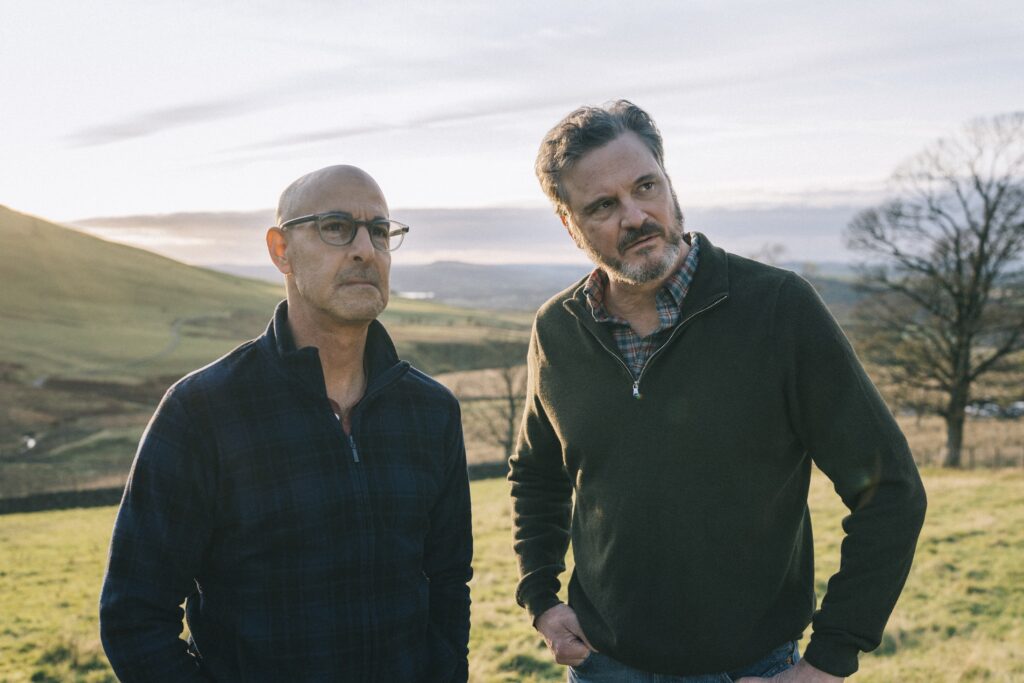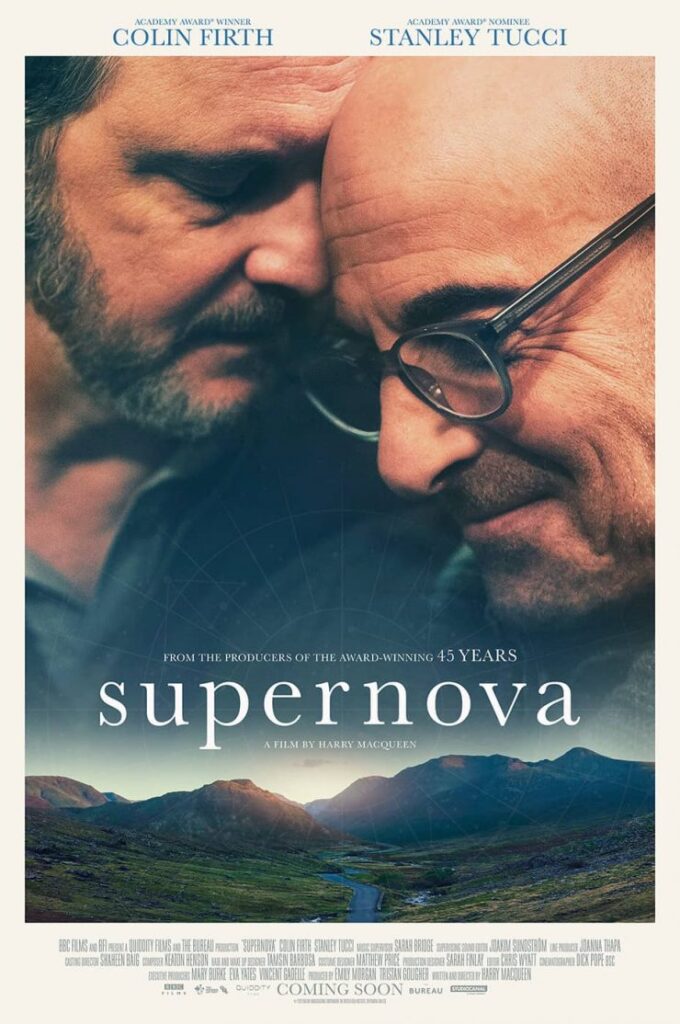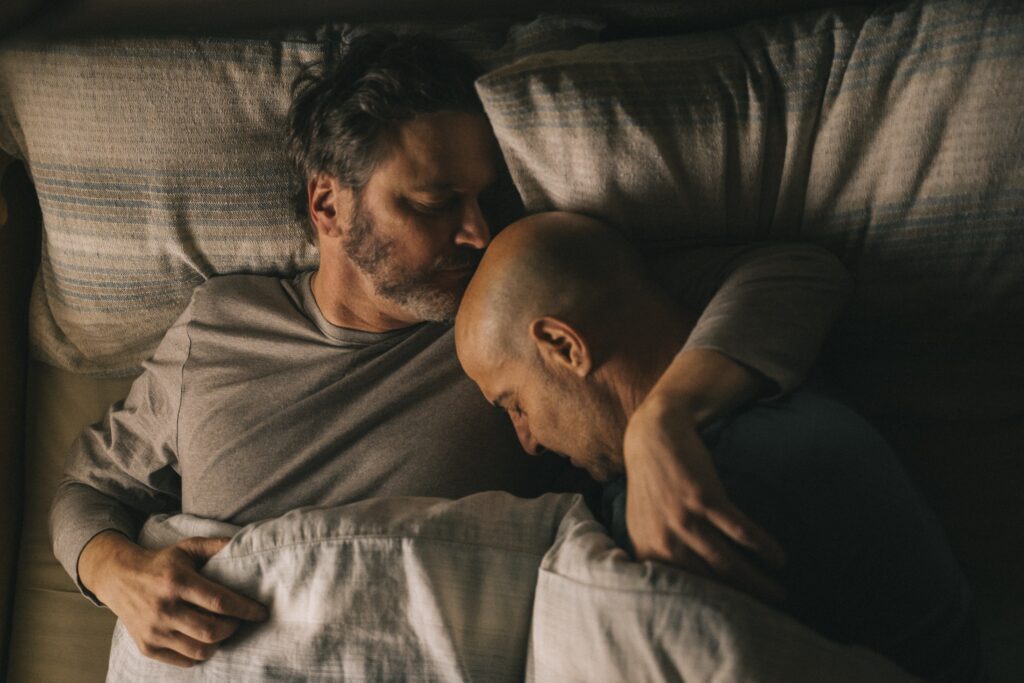‘Supernova’ tackles the tough subject of early-onset dementia
Stanley Tucci and Colin Firth play a longterm gay couple facing the crisis of their lives together.
A supernova is the explosion of a star in the final stages of its life. Eventually, the star accumulates too much matter, which causes it to blow up, resulting in a spectacular display. It’s an apt metaphor to use in a film about young-onset dementia and what it does to a brilliant human life.
Sam (Colin Firth) and Tusker (Stanley Tucci), romantic partners of 20 years, are traveling across England in their old camper van visiting friends, family, and places from their past. The trip has more to it than at first meets the eye. Tusker has been diagnosed with a dementia that is not Alzheimer’s. He has frontotemporal dementia, a neurological degeneration that affects people younger than the age of 60.
So this road trip is also about spending time together, retracing and remembering the things they loved, and trying to plan for the future. But they each have a different view of what that might look like.
Writer-director Harry Macqueen (Hinterland) has created a film that is deeply moving and possesses a simple and quiet beauty while building a portrait of modern love. Sam and Tusker bicker good-naturedly as they drive, display moments of deep love and admiration for each other. As played by two straight actors, I had no trouble believing in their bond and in many ways it’s a true pleasure to see a film about love and partnership through the lens of gay men without the film being about their sexuality or a crisis that the dominant culture ascribes to their orientation.
This is not a film about homophobia or the conditions of life for gay men; it’s a film about human character and what happens when giving care becomes the supreme gesture of love.

In this relationship, Tusker has been the anchor, the live wire, the driving force; now it’s Sam’s turn to step up. Meanwhile, Tusker is coming to grips with his inevitable decline and the reality that very soon he will be as chaotic as the aforementioned star.
As their trip together progresses through the beautiful but almost melancholy English Lake District, their individual visions for the future clash. Will they lose each other to this incurable disease?
Academy Award nominee Stanley Tucci (The Lovely Bones, Spotlight) says he was astonished by the beauty of the script written by Macqueen and shared it with his friend of 20 years, Academy Award winner Colin Firth (The King’s Speech, A Single Man). Macqueen had been inspired to write the screenplay after encountering several instances of young onset dementia, which raised questions for him surrounding living and ending a life.
“I always wanted to do something again with Colin,” says Tucci. “I’d asked him to do some of my movies, and he always turned me down, but I always wanted to work with him again. When I read this, I just thought, ‘Oh, I know the perfect person…’”
Firth and Tucci have known one another for 20 years, and their friendship dates back to a shared filming experience in London on the 2001 movie Conspiracy. “It’s obvious from the moment you spend time with them that they have a deep affection for one another,” says Macqueen. “They’re trusting and generous with one another, and that’s what we needed the characters to be.”
“Running parallel to this was my passionate desire to write a story that framed a same-sex relationship in an original manner,” says Macqueen. “To present a loving relationship for which the sexuality of the characters didn’t in any way shape the narrative. A film about long-term partners who are bound together by their deep love for each other, whilst being pushed apart by the situation they find themselves in — inspired by the personal stories I had encountered.”
Macqueen immersed himself in research over a three-year period, working with dementia specialists as well as individuals and families affected by the condition. “I have spent time with people who have since died both from dementia and suicide — in secret and in public — and seen the fallout from that first-hand.”
“It became one of the most inspiring and life-changing experiences I’ve ever had,” Macqueen says.
“When you’re dealing with something so deeply felt, and with a condition that changes so many people’s lives in the way dementia does, it’s a moral imperative to do it right,” he insists. “I promised myself that I would honor the people that had given me their time by making, hopefully, the most authentic story I could.”

And in the hands of two gay male characters, the crisis has additional nuances, such as the subtext that they had already made a supreme commitment to building a life together and without children, they are each other’s default. The stakes are higher because of this.
And the experience of gay men is, at last, seen as universal. Tucci recalls a line from one of his favorite movies, Bertrand Tavernier’s 1984 film A Sunday in the Country, in which a voiceover says, “All sorrows are alike.” “I always thought about that line, and it’s true,” he says. Tucci has had his own experience with losing a partner when his first wife died of breast cancer. “The loss of my wife, the stuff that Colin has gone through, it’s all the same in a way. It means so much when you love somebody, and really this is a movie that’s about love and loss and how we deal with it.”
Dementia does not discriminate. “This is a story about the universality of love,” says Macqueen. “To frame the experience that the characters are going through in the context of a same-sex relationship, and for that sexuality to be ultimately irrelevant to the story they were facing, did feel like an important thing to do. I wanted to normalize what is, of course, a very natural and normal thing, because I don’t think it’s done enough in cinema.”

Tucci agrees: “It’s about two people who love each other, and they happen to be gay. You could easily swap it out for a heterosexual couple, and it wouldn’t matter. But equally, the fact it’s a gay couple adds a whole other element to it that I think is really important for audiences to see. How could we ever think that love between two gay people is different than love between two straight people? Love is love. That’s it. There’s nothing more to discuss.”
Indeed, both actors found that their shared history led to depth in Sam and Tusker’s relationship that would have been much harder to fake. “You can be comfortable with one another,” Tucci reflects of working alongside Firth. “You can improvise with one another; you can make jokes. There’s no getting-to-know-you before you have to know the person really well on screen. He’s my best friend, and we know everything about each other. If you just take that history and place it in front of the camera, that’s half the job. When you add a beautiful script, it’s like you don’t have to do anything at all.”
“To have these two men play these two roles will probably forever be one of the most humbling experiences I’ll have as a director,” Macqueen says of his collaboration with Firth and Tucci. “From the first morning we turned over on the film, it was very obvious to everyone that we’d made the right choice, and that these guys were going to take my script and run with it. It was a unique experience, working with them.”
Supernova is in theaters and streaming.






